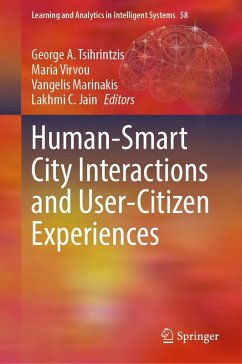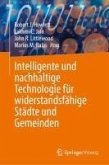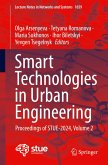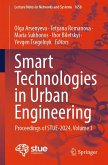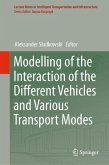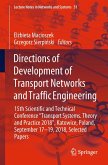Human-Smart City Interactions and User-Citizen Experiences
Herausgegeben:Tsihrintzis, George A.; Virvou, Maria; Marinakis, Vangelis; Jain, Lakhmi C.
Human-Smart City Interactions and User-Citizen Experiences
Herausgegeben:Tsihrintzis, George A.; Virvou, Maria; Marinakis, Vangelis; Jain, Lakhmi C.
- Gebundenes Buch
- Merkliste
- Auf die Merkliste
- Bewerten Bewerten
- Teilen
- Produkt teilen
- Produkterinnerung
- Produkterinnerung
This book focuses on human-smart city interaction, exploring how people engage with smart technologies and how human factors influence the citizen experience. Smart cities aim to enhance urban life by infusing digital technologies, data analytics, and artificial intelligence into city functions. Through widespread use of ICT, they streamline operations, cut costs, and improve citizen experiences by analyzing real-time data from sensors, infrastructure, and residents. Yet, their full potential remains largely underused. It is intended for academics, researchers, practitioners, and students in…mehr
Andere Kunden interessierten sich auch für
![Intelligente und nachhaltige Technologie für widerstandsfähige Städte und Gemeinden Intelligente und nachhaltige Technologie für widerstandsfähige Städte und Gemeinden]() Intelligente und nachhaltige Technologie für widerstandsfähige Städte und Gemeinden159,99 €
Intelligente und nachhaltige Technologie für widerstandsfähige Städte und Gemeinden159,99 €![Smart Technologies in Urban Engineering Smart Technologies in Urban Engineering]() Smart Technologies in Urban Engineering151,99 €
Smart Technologies in Urban Engineering151,99 €![Smart Technologies in Urban Engineering Smart Technologies in Urban Engineering]() Smart Technologies in Urban Engineering151,99 €
Smart Technologies in Urban Engineering151,99 €![Modelling of the Interaction of the Different Vehicles and Various Transport Modes Modelling of the Interaction of the Different Vehicles and Various Transport Modes]() Modelling of the Interaction of the Different Vehicles and Various Transport Modes113,99 €
Modelling of the Interaction of the Different Vehicles and Various Transport Modes113,99 €![Roundabouts as Safe and Modern Solutions in Transport Networks and Systems Roundabouts as Safe and Modern Solutions in Transport Networks and Systems]() Roundabouts as Safe and Modern Solutions in Transport Networks and Systems76,99 €
Roundabouts as Safe and Modern Solutions in Transport Networks and Systems76,99 €![Directions of Development of Transport Networks and Traffic Engineering Directions of Development of Transport Networks and Traffic Engineering]() Directions of Development of Transport Networks and Traffic Engineering76,99 €
Directions of Development of Transport Networks and Traffic Engineering76,99 €![The Human Element in Container Shipping The Human Element in Container Shipping]() The Human Element in Container Shipping64,80 €
The Human Element in Container Shipping64,80 €-
-
-
This book focuses on human-smart city interaction, exploring how people engage with smart technologies and how human factors influence the citizen experience. Smart cities aim to enhance urban life by infusing digital technologies, data analytics, and artificial intelligence into city functions. Through widespread use of ICT, they streamline operations, cut costs, and improve citizen experiences by analyzing real-time data from sensors, infrastructure, and residents. Yet, their full potential remains largely underused.
It is intended for academics, researchers, practitioners, and students in fields like engineering, artificial intelligence, policy, and governance, while remaining accessible to readers from other disciplines as well. Authored by leading researchers, each chapter includes extensive references for deeper exploration of specific smart city applications.
It is intended for academics, researchers, practitioners, and students in fields like engineering, artificial intelligence, policy, and governance, while remaining accessible to readers from other disciplines as well. Authored by leading researchers, each chapter includes extensive references for deeper exploration of specific smart city applications.
Produktdetails
- Produktdetails
- Learning and Analytics in Intelligent Systems 58
- Verlag: Springer / Springer Nature Switzerland / Springer, Berlin
- Artikelnr. des Verlages: 89552628, 978-3-032-06363-2
- Seitenzahl: 288
- Erscheinungstermin: 20. Januar 2026
- Englisch
- Abmessung: 235mm x 155mm
- ISBN-13: 9783032063632
- ISBN-10: 3032063639
- Artikelnr.: 75209549
- Herstellerkennzeichnung
- Springer-Verlag GmbH
- Tiergartenstr. 17
- 69121 Heidelberg
- ProductSafety@springernature.com
- Learning and Analytics in Intelligent Systems 58
- Verlag: Springer / Springer Nature Switzerland / Springer, Berlin
- Artikelnr. des Verlages: 89552628, 978-3-032-06363-2
- Seitenzahl: 288
- Erscheinungstermin: 20. Januar 2026
- Englisch
- Abmessung: 235mm x 155mm
- ISBN-13: 9783032063632
- ISBN-10: 3032063639
- Artikelnr.: 75209549
- Herstellerkennzeichnung
- Springer-Verlag GmbH
- Tiergartenstr. 17
- 69121 Heidelberg
- ProductSafety@springernature.com
George A. Tsihrintzis received (with honors) the Diploma of ECE from the National Technical University of Athens, Greece, and the M.Sc. and Ph.D. degrees in ECE from Northeastern University, Boston, USA. He is currently a Professor in the University of Piraeus, Greece and has served as Director of the Graduate Program of Study in “Advanced Computing and Informatics Systems” (2008–2022), Head of the Department of Informatics (2016-2020) and Member of the Administration Council of the University of Piraeus (2012-2016 and 2022–2026). He has (co-)authored over 400 research publications which have appeared in international journals, book chapters, and conference proceedings. He has organized and chaired over 45 international conferences, has received best paper awards from several international conferences, and has been a keynote speaker of several international conferences. He is ranked among the top 2% of the most influential scientists worldwide of Scientists List at Stanford University ranking in ARTIFICIAL INTELLIGENCE, both career-wise and single year, for 2023 and 2024. Maria Virvou is Dean of the School of Information and Communication Technologies at the University of Piraeus, Greece, and Professor in its Department of Informatics. She is Founder and Director of the Graduate Program in “Informatics” and Director of its Software Technology Research Laboratory. She is co-founder and co-editor-in-chief of the Springer book series “Learning and Analytics in Intelligent Systems” and “Artificial Intelligence-Enhanced Software and Systems Engineering” and co-founder and co-chair of the IEEE Information, Intelligence, Systems and Applications (IISA) International Conference annual series. She previously served as an editor-in-chief of SpringerPlus (Springer) and currently serves as an associate editor of Knowledge-Based Systems (Elsevier). She is consistently ranked among the top 2% of researchers worldwide with the highest scientific impact, according to the global academic ranking by Stanford University, particularly in the field of Artificial Intelligence. Vangelis Marinakis is Assistant Professor in the School of Electrical and Computer Engineering (ECE) of the National Technical University of Athens (NTUA). He is an Electrical and Computer Engineer of NTUA and holds a PhD in the research domain of decision support systems for sustainable energy planning. His research is focused on the design and development of methodologies and decision support systems, using leading-edge ICTs technologies (Internet of things, artificial intelligence, big data technologies) for intelligent energy management at different levels (smart homes, smart buildings, smart cities, smart districts), as well as increased energy efficiency gains and renewables. In the above-mentioned fields, Dr. Marinakis has worked on more than 25 European and national co-funded projects. Lakmhi C. Jain, PhD, ME, BE(Hons), Fellow (Engineers Australia) is with KES International, Shoreham-by-Sea, UK. Professor Jain’s career is characterized by his solid commitment to research, education, and mentorship, as he has been a distinguished professor at numerous universities. His research works encompass automated information system design; modeling, design, and implementation of knowledge-based intelligent information systems; intelligent agent learning, coordination, collaboration, and Web-based agents. He has (co-)authored or (co-)edited more than 500 volumes. He is co-founder and co-editor-in-chief of several scientific journals and series.
Introduction to Human-Smart City Interactions and User-Citizen Experiences.- Extreme-Value-Aware Synthetic Data Generation in Electric Vehicle Charging: A GAN Framework with EVA-Based Conditioning and Evaluation.- Energy Poverty Meets Disability: A Critical Analysis of Financial Support Gaps in Europe.- Security of personal data processing when using artificial intelligence systems in smart cities: Processes and tools to address GDPR compliance challenges.- AI in Citizen-Centric Smart Cities. Exploring Data Privacy, Algorithmic Transparency and Trustworthiness Through Regulation.- Empowering Smart Tourism with Large Language Models.- Sentiment Analysis Using LSTM and BERT: A Comparative Analysis using Natural Language Processing Algorithms.- Adaptive User Interface for Electric Vehicle Route Information in Urban Mobility Services.- Design and Implementation of a Smart Recycling Bin Using Multi-Sensor Integration and Machine Learning.- Smarts Sensors and Social Sensibility.- A framework for autonomous crowd management through reinforcement learning and digital twins.- A Reinforcement Learning System that Learns from Human-Smart City Interaction for providing better quality of services.- A Diagnostic Clinical Decision Support System which leverages the Medical Information of Patients suffering from Pneumonia.
Introduction to Human-Smart City Interactions and User-Citizen Experiences.- Extreme-Value-Aware Synthetic Data Generation in Electric Vehicle Charging: A GAN Framework with EVA-Based Conditioning and Evaluation.- Energy Poverty Meets Disability: A Critical Analysis of Financial Support Gaps in Europe.- Security of personal data processing when using artificial intelligence systems in smart cities: Processes and tools to address GDPR compliance challenges.- AI in Citizen-Centric Smart Cities. Exploring Data Privacy, Algorithmic Transparency and Trustworthiness Through Regulation.- Empowering Smart Tourism with Large Language Models.- Sentiment Analysis Using LSTM and BERT: A Comparative Analysis using Natural Language Processing Algorithms.- Adaptive User Interface for Electric Vehicle Route Information in Urban Mobility Services.- Design and Implementation of a Smart Recycling Bin Using Multi-Sensor Integration and Machine Learning.- Smarts Sensors and Social Sensibility.- A framework for autonomous crowd management through reinforcement learning and digital twins.- A Reinforcement Learning System that Learns from Human-Smart City Interaction for providing better quality of services.- A Diagnostic Clinical Decision Support System which leverages the Medical Information of Patients suffering from Pneumonia.

